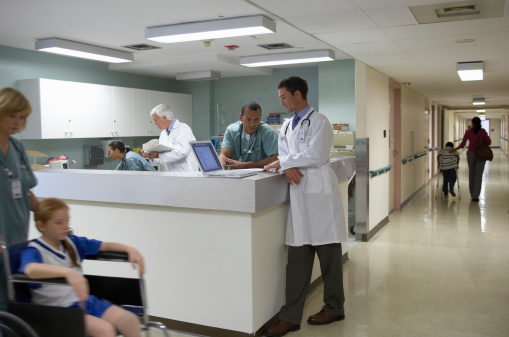Voice recognition software is useful but comes with some snags when used in hospitals. Complex medical language and privacy are two main issues.
While voice recognition software is an excellent way to make life easier when you are on the run, it isn’t really an effective technology to use in hospitals quite yet. It would be perfect for physicians to be able to walk down the hall, ordering tests into their smartphone, but there are some problems with using voice recognition in hospitals at this time that make it more risky than useful.

Medical Language Is Complex
With the complexity of medical terms, many of the words used to sound very similar but are completely different. With the auto-correct feature in voice-to-text software, this could lead to significant clinical errors. The voice-to-text software currently available simply isn’t sophisticated enough to catch the nuances in medical language and it’s not worth the risk.
Hospitals are Loud Environments
Voice recognition software requires minimal background noise to adequately hear the speech to be recognized. Hospitals are noisy, active places and the ability to use voice recognition software would be highly compromised. The time it would take a physician to find a quiet place to for the voice recognition software to work correctly would waste more time than only writing down the note.
Hospitals Need Privacy
One of the most valuable benefits of voice recognition software is that it is “hands-free.” The problem is, using the software also requires using a speakerphone. When a speakerphone is used, there is no privacy for the patient. While this might work in a few situations, there is always someone around ready to listen to the next medical test being ordered by speakerphone. The technology simply isn’t private enough for doctors ordering sensitive tests for patients in their care.
The Voice-to-Text Creation Isn’t Private
Hospitals are under strict HIPPA regulations which protect the rights and privacy of the patients they are treating. The speech used in the voice recognition software isn’t translated to text within the privacy of the hospital. In fact, the speech is translated outside the four walls of the hospital and is at risk for intrusion from hackers. Using voice to text software within a hospital can easily break HIPPA laws.
Voice recognition software is an excellent tool for individuals who are on the run and want to set appointments, reminders, or check something quick on the internet. While the technology is quite useful, hospitals just aren’t ready to adopt this type of software. The privacy concerns alone make voice recognition software hard for hospitals to adapt, and it is just isn’t private enough for use among other patients. With the technical factor of medical language added in, hospitals aren’t ready for the use of popular voice recognition software in patient care situations.
Author: Aaron White, Date: 27th February 2017




Follow eSOZO on Social Media